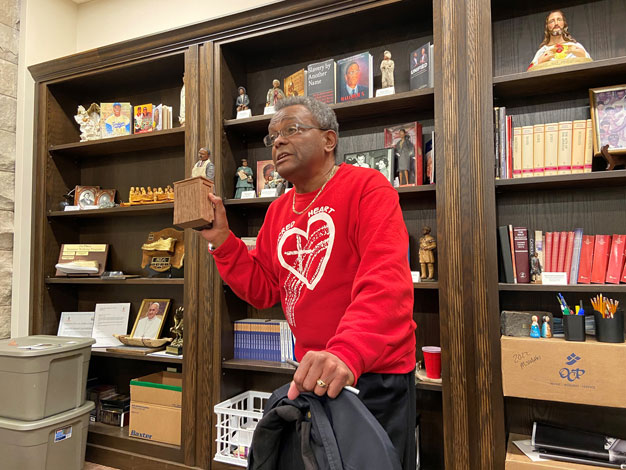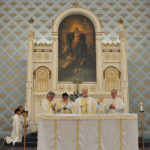
Jim Collins gives a presentation on Black History Month at the St. Martin de Porres Society meeting at Sacred Heart Cathedral in Davenport earlier this month.
By Barb Arland-Fye
Editor
Jim Collins walked down the grocery store aisle that contains pancake mix and remembered, with a tinge of sadness, that he would not see Aunt Jemima’s smiling face on any of the boxes. Nor would he find Uncle Ben’s rice in the store.
Both products have new brand names because of concerns about racial stereotypes, Jim told St. Martin de Porres Society members during his Feb. 15 presentation on Black History Month at Sacred Heart Cathedral in Davenport. Holding a box of each food product in his hands, Jim shared his perspective on the rebranding. He offered many insights during his presentation, but this one made a lasting impression on me about the value of family and community.
We had a conversation about his insights a week after the presentation at Sacred Heart Cathedral, where he is a member with his wife, Karen. Jim also serves as secretary of the St. Martin de Porres Society. Thomas Mason IV is president. The society seeks to raise awareness of the rich legacy Black Catholics bring to the Church, evangelize the unchurched, teach the richness of cultural diversity in the parish, diocese, community and the world, and present role models and icons representing diverse cultures.
Jim, who converted to Catholicism years ago, grew up in the African Methodist Episcopal (AME) church in downtown Moline. Some 50 to 75 Black people belonged to the church. “Everybody was your family and they treated you like family,” he said. The adults carried the honorary title of “aunt” or “uncle,” regardless of biological relationship.
Jim knew his parents’ best friends as Uncle Abe and Aunt Elizabeth. They filled in when Mom and Dad were unable to attend a child’s event or activity. “The rest of my blood relatives, none of them lived here,” Jim said. He mentioned other aunts and uncles at the church who played important roles in his life, such as Aunt Johnnie Mae, who led Sunday school.
“When I looked at Aunt Jemima, I didn’t look at her as a black face in a minstrel show,” Jim said, referring to “a comic variety show presented by a company of performers in blackface” (CollinsDictionary.com). Her character evolved into a successful marketing persona. “She was a business woman,” Jim continued.
Aunt Jemima and Uncle Ben went away because Black and white people decided the images were condescending toward Black people, Jim continued. “They said it is representative of menial work, but my mother was a housekeeper.” The income she earned supplemented the family’s income. “She did that to help support Dad,” Jim said. She became an important part of another family because she cooked, cleaned and cared for their children. “We are all family.”
Church fosters and encourages that larger sense of family, Jim believes. That is why he longs for all of us, Black and white, to end our self-imposed segregation and come together as a family of faith. “Simply put, I don’t see that happening. I think most white people are hesitant about going to a predominantly Black church and most Black people are hesitant about going to a predominantly white church.”
“If faith is the center of our church, then we should feel more comfortable talking to each other. We are all God’s children,” Jim says. When we go to church together, “we come to know each other.”
Let’s go meet the family!
(Contact Barb Arland-Fye at arland-fye@davenportdiocese.org)











